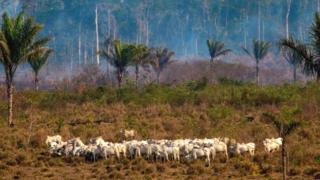 Image copyright Getty Images
Image copyright Getty Images
Up to one-fifth of Brazil's soya exports to the European Union may be "contaminated" by illegal deforestation, a study has found.
Researchers used freely available maps and data to identify the specific farms and ranches clearing forests to produce soya and beef destined for Europe.
They found 2% of properties were responsible for 62% of illegal deforestation.
These "bad apples" have global environmental consequences, they said.
Prof Raoni Rajão, of the Universidade Federal de Minas Gerais in Brazil, said it was up to the country's political and economic leaders to root out "the bad apples in the soy and beef sectors".
"Brazil has the information it needs to take swift and decisive action against these rule-breakers to ensure that its exports are deforestation-free," he said.
What does the study show?
Reports from non-governmental organisations and journalistic investigations have previously revealed cases of soya and beef being produced in areas of deforestation and exported.
But this is the first study to link property-level illegal deforestation with export data.
The research, published in the journal Science, found that 2% of properties in the Amazon rainforest and the Cerrado grasslands are responsible for 62% of all potentially illegal deforestation.
Roughly 20% of soya exports and at least 17% of beef exports to the EU may be "contaminated with illegal deforestation", the researchers said.
According to their analysis, two million tons of soya grown on properties with illegal deforestation may have reached EU markets annually during the period of analysis, 500,000 of which came from the Amazon.
As the soya is fed mainly to livestock, customers can't be sure whether the meat they buy is "deforestation-free".
Duncan Brack, of the Chatham House think tank, said the study strengthened the argument for government measures to end UK consumers' contribution to deforestation, such as a due-diligence or duty-of-care obligation on companies importing products such as beef or soya.
What is the scale of the problem?
A recent report found the majority of all soya (65%) comes from countries with high deforestation rates. The land required overseas to meet the UK's annual demand for soya between 2016 and 2018 equated to an area approaching the size of Wales, according to environmental groups WWF and the RSPB.
"Without knowing it, we're eating meat and dairy products from animals fed on soy grown on deforested land in Brazil," said Mike Barrett, executive director of science and conservation at WWF-UK.
"We need to stop importing habitat destruction."
In 2019, an area of primary forest the size of a football pitch was lost every six seconds across the world, according to a study by the University of Maryland, US.
Brazil accounted for a third of it, its worst loss in 13 years apart from huge spikes in 2016 and 2017 from fires.
Follow Helen on Twitter.
The Link LonkJuly 18, 2020 at 06:35AM
https://ift.tt/2DVmsrR
Amazon soya and beef exports 'linked to deforestation' - BBC News
https://ift.tt/2RxTDX4
Beef

No comments:
Post a Comment